In the 21st century, the United States has been visibly inching ever closer to failed-state status, writes Karen J. Greenberg.
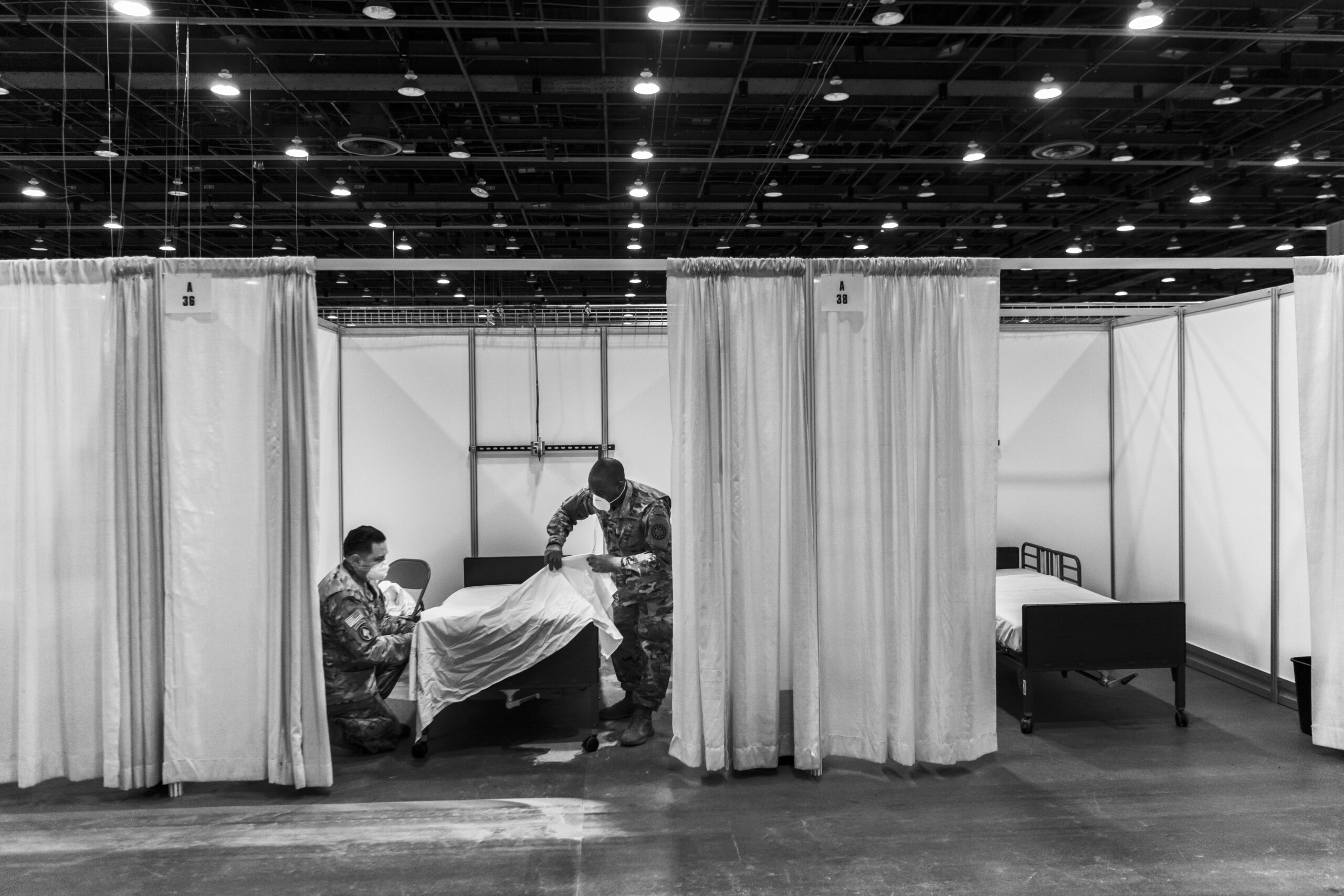
Michigan National Guard members make bed in temporary hospital in Detroit’s TFC Center, April 9, 2020, during Covid-19 pandemic. (National Guard)
By Karen J. Greenberg
TomDispatch.com
 These past few months, it’s grown ever harder to recognize life in America. Thanks to Covid-19, basic day-to-day existence has changed in complicated, often confusing ways. Just putting food on the table has become a challenge for many. Getting doctors’ appointments and medical care can take months. Many schools are offering online-only instruction and good luck trying to get a driver’s license or a passport renewed in person or setting up an interview for Social Security benefits. The backlog of appointments is daunting.
These past few months, it’s grown ever harder to recognize life in America. Thanks to Covid-19, basic day-to-day existence has changed in complicated, often confusing ways. Just putting food on the table has become a challenge for many. Getting doctors’ appointments and medical care can take months. Many schools are offering online-only instruction and good luck trying to get a driver’s license or a passport renewed in person or setting up an interview for Social Security benefits. The backlog of appointments is daunting.
Meanwhile, where actual in-person government services are on tap, websites warn you of long lines and advise those with appointments to bring an umbrella, a chair, and something to eat and drink, as the Department of Motor Vehicles in Hudson, New York, instructed me to do over the summer. According to a September 2020 Yelp report, approximately 164,000 businesses have closed nationwide due to the pandemic, an estimated 60 percent of them for good. CNBC reports that 7.5 million businesses may still be at risk of closing. Meanwhile, more than 225,000 Americans have died of the coronavirus and, as a winter spike begins, it’s estimated that up to 410,000could be dead by year’s end.
Then there are the signs of increasing poverty. Food banks have seen vast rises in demand, according to Feeding America, a network of 200 food banks and 60,000 food pantries and meal programs. According to a study done by Columbia University’s Center on Poverty and Social Policy, between February and September, the monthly poverty rate increased from 15 percent to 16.7 percent, despite cash infusions from Congress’s CARES Act. That report also concluded that the CARES program, while putting a lid on the rise in the monthly poverty rate for a time, “was not successful at preventing a rise in deep poverty.” And now, of course, Congress seems likely to offer nothing else.
The rate of unemployment is down from a high of 14 percent in April, but still twice what it was in January 2020 and seemingly stabilizing at a disturbing 8 percent. Meanwhile, schools and universities are struggling to stay viable. Thirty-four percent of universities are now online and only 4 percent are conducting fully in-person classes. The policy of stores limiting purchases in the spring and summer is still a fresh memory.
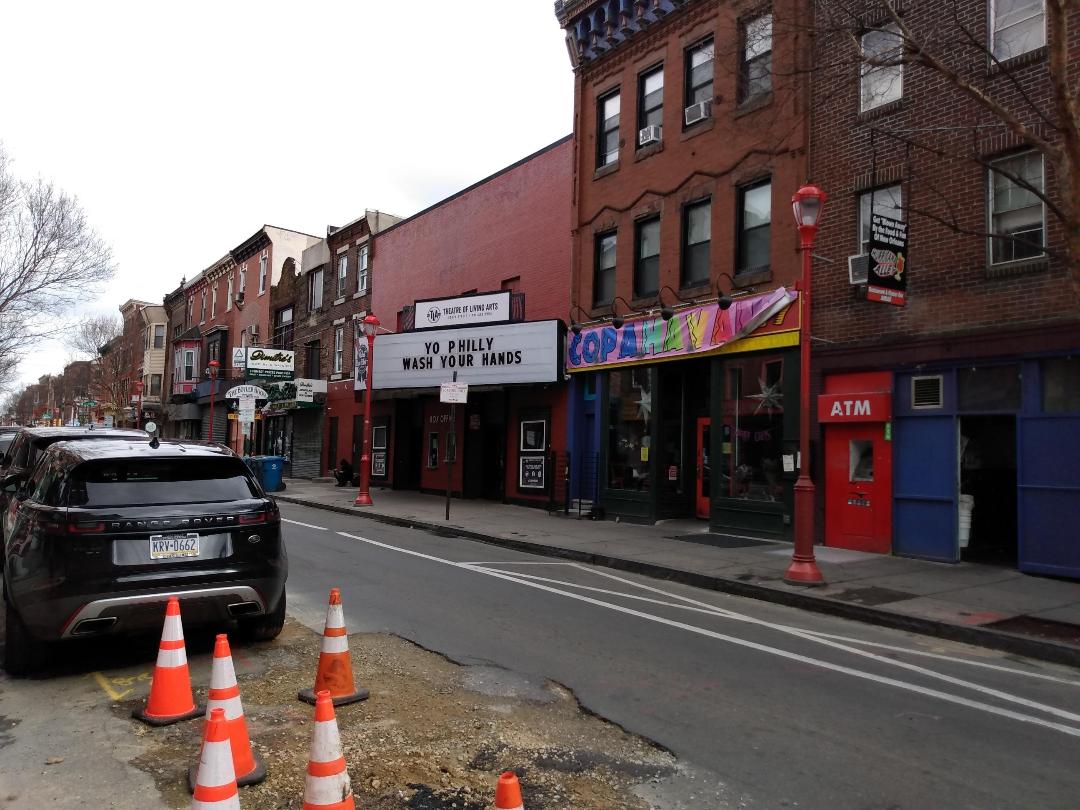
Street in Philadelphia early in the Covid-19 pandemic, March 17, 2020. (Morris Levin, CC BY-SA 4.0, Wikimedia Commons)
And what about freedom of movement? Dozens of countries, including most of the European Union, Latin America, Japan, Australia, and New Zealand, have barred entry to American tourists and travelers, given this country’s devastatingly high rate of infection. Canada and Mexico just re-upped their bans on U.S. travelers, too. In a sense, the pandemic has indeed helped build a “great, great wall” around America, one that won’t let any of us out.
In fact, Americans are not being welcomed, even by one another. Inside our borders, states are requiring those arriving from other states with high percentages of Covid-19 cases to quarantine themselves for 14 days on arrival (though enforcing such mandates is difficult indeed). New York Governor Andrew Cuomo’s list of places subject to such a travel advisory now includes 43 of the 49 other states.
And as we are reminded on a daily basis in the run-up to Election Day, early voters, especially in heavily minority districts, are being forced to wait long hours in endless lines in states where the pandemic is beginning to spike. In some places, local officials clearly set up the conditions for this as a deterrent to those they would prefer not to see at the polls. In Georgia, where a governor was intent on reducing the numbers of polling places to reduce turnout in African-American neighborhoods, the waiting time recently was up to 11 hours. Early voting lines in New York City “stretched for blocks” in multiple venues.
To top it all off, political and racial violence in the country is climbing, often thanks to uniformed law enforcement officers. From George Floyd’s death to federal officials in unmarked vehicles dragging protesters off the streets of Portland, Oregon, to federal law enforcement officers using rubber bullets and tear gas on a gathering crowd of protestors to clear a path to a local church for President Trump, such cases have made the headlines. Meanwhile, officials across the country are ominously preparing to counter violence on Election Day.
Protests tonight in West Philly because of police shooting earlier today of Black resident Walter Wallace. #phillyprotests #walterwallace pic.twitter.com/saZfqi7b3k
— Kylie Cooper (@kylieacooper) October 27, 2020
In the face of such challenges and deprivations, Americans, for the most part, are learning to adapt to the consequences of the pandemic, while just hoping that someday it will pass, that someday things will return to normal. As early as March 2020, a Pew poll had already detected a significant uptick in symptoms of anxiety nationwide. The percentage of such individuals had doubled, with young people and those experiencing financial difficulties driving the rise.
The American Psychological Association (APA) considers the pandemic not just an epidemiological but a “psychological crisis.” The website of the Centers for Disease Control and Prevention has a paper written by two APA authors suggesting that Covid-19 is already taking “a tremendous psychological toll” on the country.
Failing, American-Style
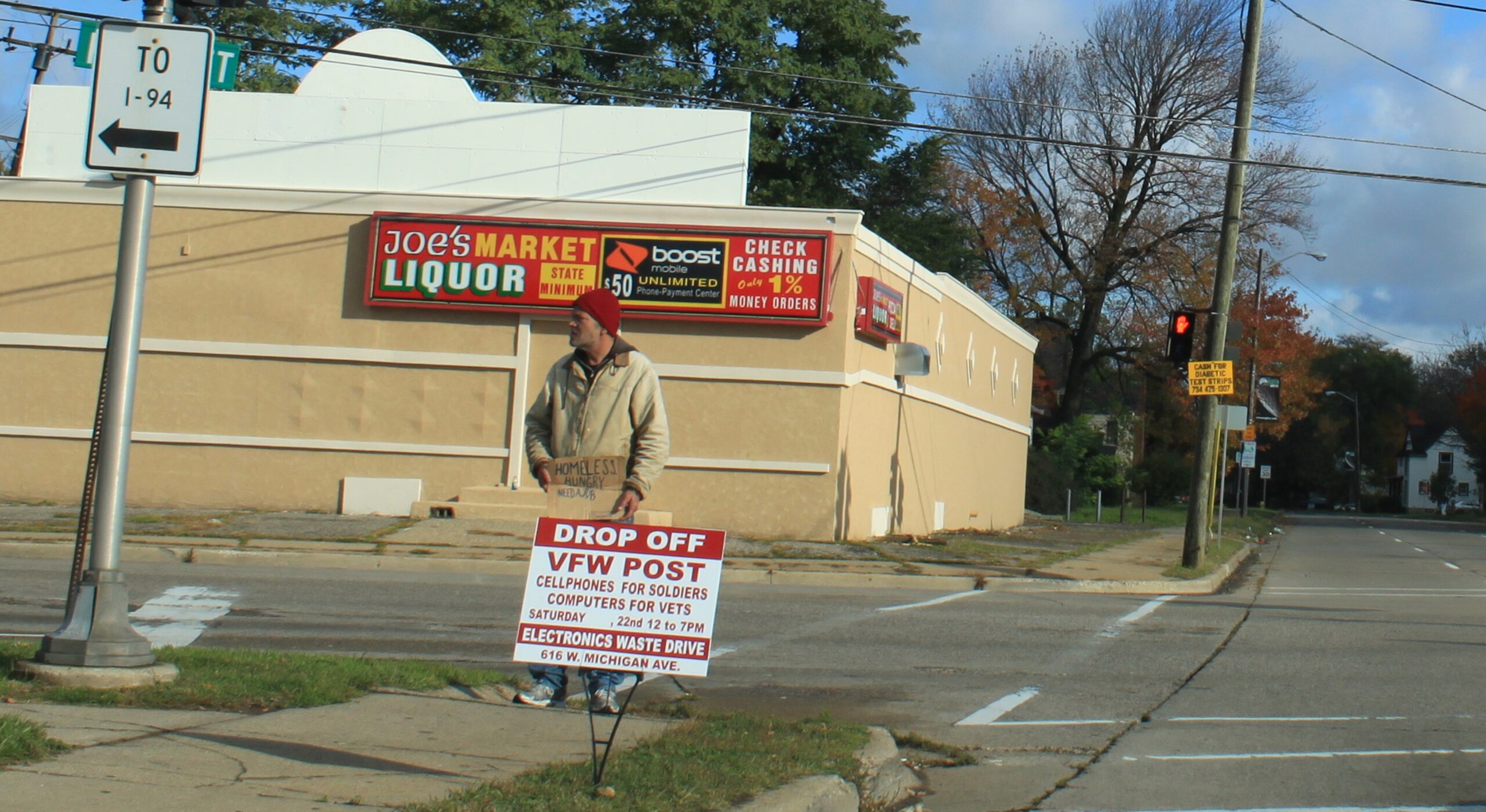
Soliciting employment, Ypsilanti, Michigan, 2011. (Dwight Burdette, CC BY 3.0, Wikimedia Commons)
All in all, we find ourselves in a daunting new world, but don’t just blame it on the pandemic. This country was living in a state of denial before Covid-19 hit. The truth is that Americans have been in trouble for a surprisingly long time. The pandemic might have swept away that sense of denial and left us facing a new American reality, as that virus exposed previously ignored vulnerabilities for all to see.
So, expect one thing: that the indicators of America’s decline will far surpass the problems that can be solved by addressing the pandemic’s spread. When Covid-19 is brought under some control, the larger social system may unfortunately remain in tatters, in need of life support, posing new challenges for the country as a whole.
Several observers, witnessing such potentially long-lasting changes to the fabric of American life, have described the United States as resembling a failed state in its reaction to the pandemic. They point not just to the effects of staggering levels of inequality (on the rise for decades) or to a long-term unwillingness to invest in the kind of infrastructure that could keep what’s still the wealthiest country on our planet strong, but to entrenched poverty and the fracturing of work life. Long before the pandemic hit, the Trump administration reflected this downhill slope.
As George Packer recently wrote in the Atlantic, the reaction to the coronavirus crisis here has been more “like Pakistan or Belarus — like a country with shoddy infrastructure and a dysfunctional government whose leaders were too corrupt or stupid to head off mass suffering… Every morning in the endless month of March,” he added, “Americans woke up to find themselves citizens of a failed state,” unable to get the equipment, supplies, tests, or medical help they needed to fight the pandemic.
Looking beyond Covid-19 to the Trump administration’s irresponsible handling of climate change and nuclear weapons, TomDispatch’s Tom Engelhardt has also labeled the country a “failed state,” one that now occupies a singular category (which he called “Fourth World”) among the planet’s countries.
There is no codified definition of a failed state, but there is general agreement that such a country has become unable or unwilling to care for its citizens. Safety and sustenance are at risk and stability in multiple sectors of life has become unpredictable. In 2003, future U.N. Ambassador Susan Rice attempted to craft a workable definition of the term in a report for the Brookings Institution, calling on President George W. Bush to address the underlying causes of failed states. “Failed states,” she wrote, “are countries in which the central government does not exert effective control over, nor is it able to deliver vital services to significant parts of its own territory due to conflict, ineffective governance, or state collapse.”
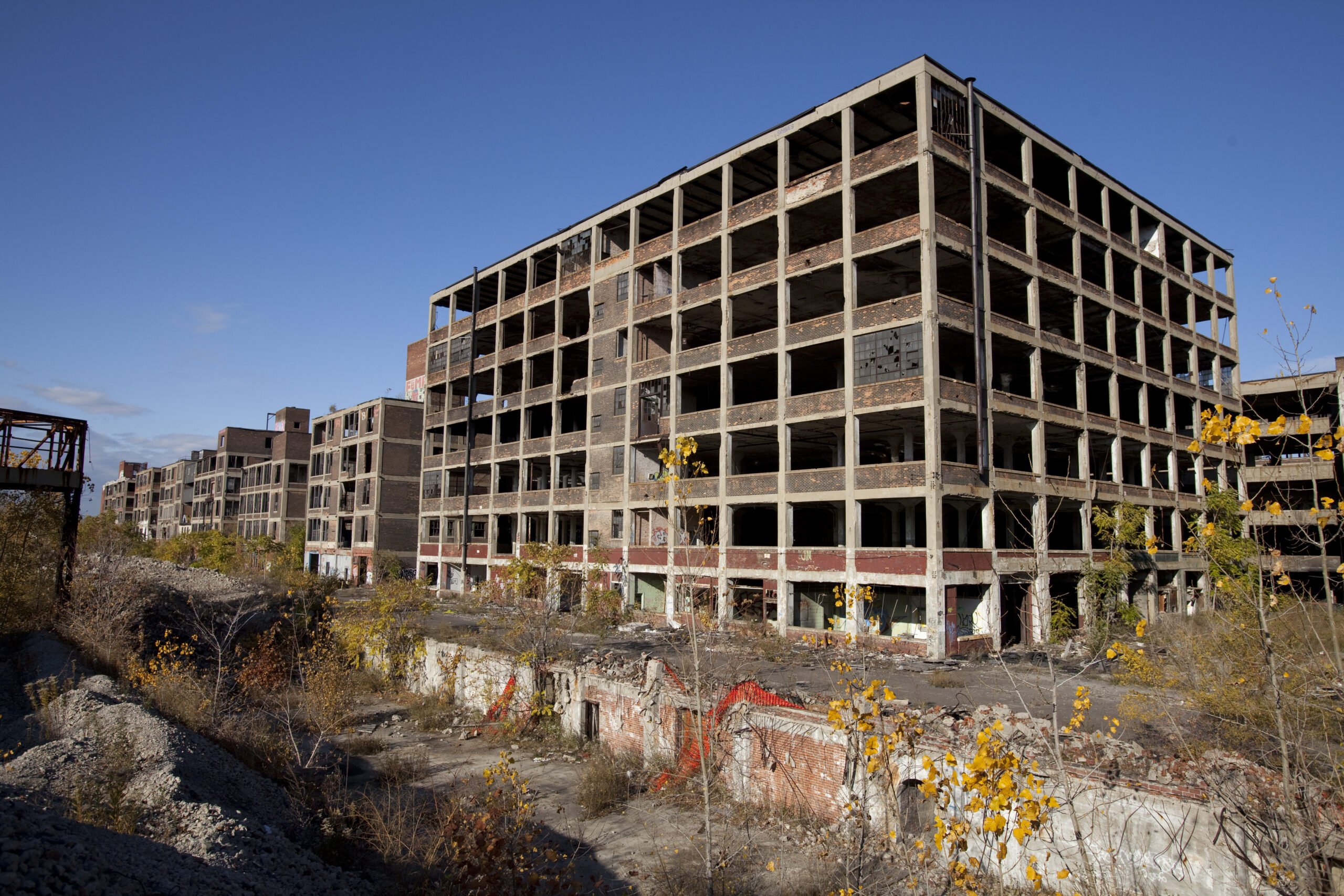
Western part of the abandoned Packard Automotive Plant in Detroit, 2009. (Albert Duce, CC BY-SA 3.0, Wikimedia Commons)
From the Proud Boys to the Wolverine Watchmen, it has become strikingly clear that, in this pandemic year, the U.S. is indeed becoming an increasingly riven, disturbed land and that nothing, including the election of Joe Biden, will simply make that reality disappear without immense effort.
In the 21st century, in fact, the United States has visibly been inching ever closer to failed-state status. In 2006, the Fund for Peace, an organization whose mission is global conflict reduction, human security, and economic development, launched a yearly Failed States Index (FSI), changing its name in 2014 to the Fragile State Index. For the last decade, for instance, Yemen has been among the top 10 most fragile states and, for the last two years, number one. Since 2013, Finland has been at the other end of the scale, number 178, the least failed state on the planet.
What’s interesting, however, is the path the United States has travelled over that same decade, dropping a noteworthy 10 places. Until the Trump years, it consistently stood at number 158 or 159 among the 178 nations on the chart. In the 2018 report, however, it took a turn for the worse. In the 2020 report (based on pre-pandemic numbers), it had dropped to 149, reflecting in particular losses in what FSI calls “cohesion,” based on rising nationalist rhetoric among increasingly riven elites and unequal access to resources in a country where economic inequality was already at staggering levels.
Just imagine, then, what the 2021 Index will likely report next April. At present, when it comes to FSI’s rankings, the United States is in the third of five groupings of countries, behind the Scandinavian countries, most of the other nations of Europe, and Singapore. Given today’s realities, it is poised to fall even further.
The Election Moment
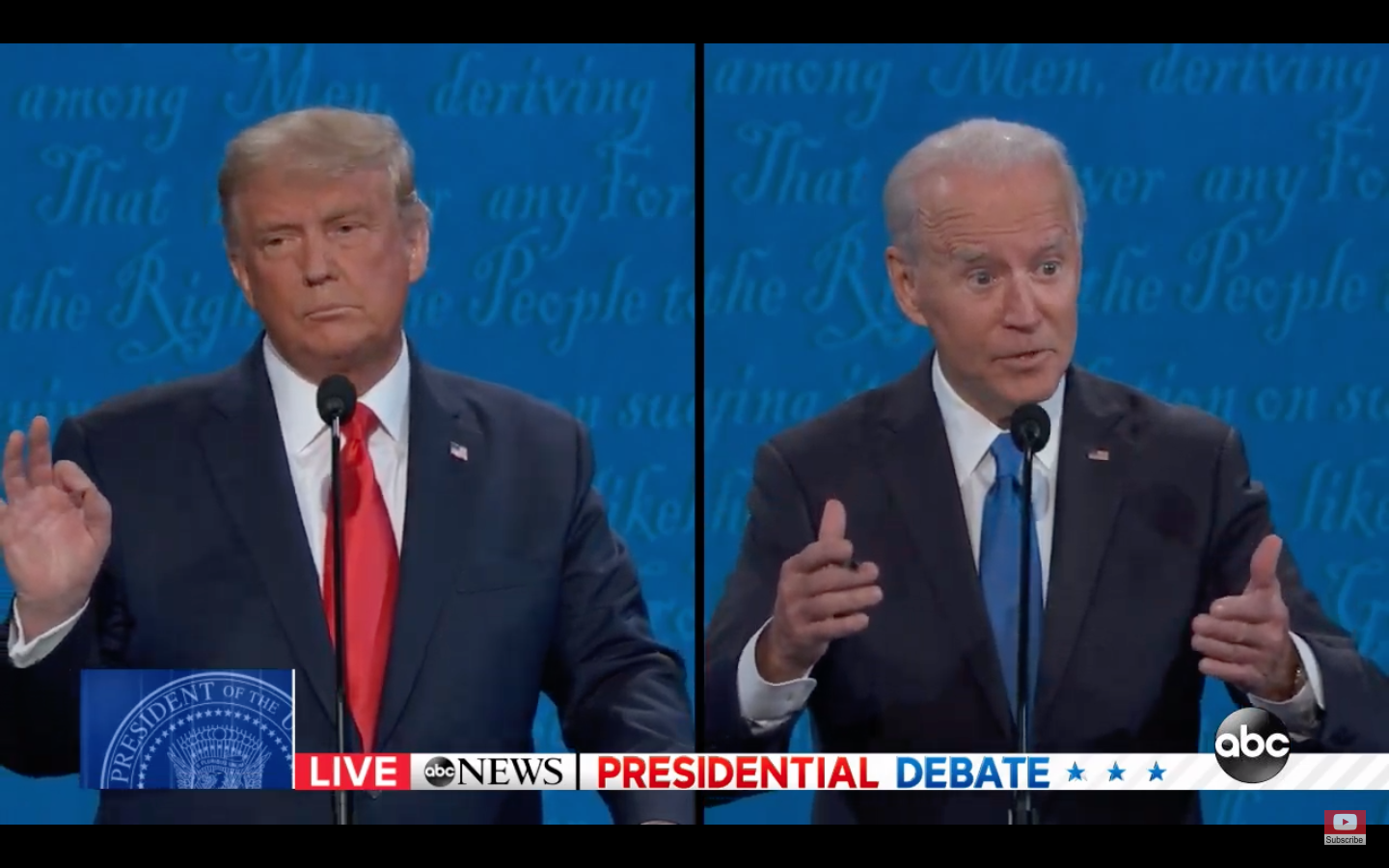
(Oct. 22, 2020, screenshot)
Elections are a crucial factor in separating successful from failing states; fair elections, that is, ones that people in a country trust. As Pauline Baker, the director of the Fund for Peace, points out, “Elections are an essential part of democratization, but they can also be conflict-inducing if they are held too soon, are blatantly manipulated, lack transparency, or are marred by violence.”
All you have to do is think about Donald Trump’s endless claims — that this year’s election will be “rigged,” that mail-in ballots will be a fraud, that he won’t necessarily leave office even if the tallies are against him, and so on — to know that a particularly heavy burden has been placed on the results of Nov. 3. Add to that burden threats to the election’s viability via disinformation from foreign agents and hackers, Republican Party attempts at voter suppression, and threats of violence by so-called poll watchers.
Meanwhile, an embattled Supreme Court has been issuing decisions on matters like “faithless electors,” extended voting, and absentee ballots. The record so far has been mixed at best. On the one hand, the justices have voted to keep intact the Electoral College rule that requires electors to honor their pledges to vote according to whatever the voters have decided. They also nixed an attempt by the Republican National Committee to enforce a Rhode Island rule that mail-in voters, under pandemic conditions, must have their ballots signed by either two witnesses or a notary public. And most recently, the Court voted 4-4 to uphold Pennsylvania’s decision to extend the absentee ballot deadline.
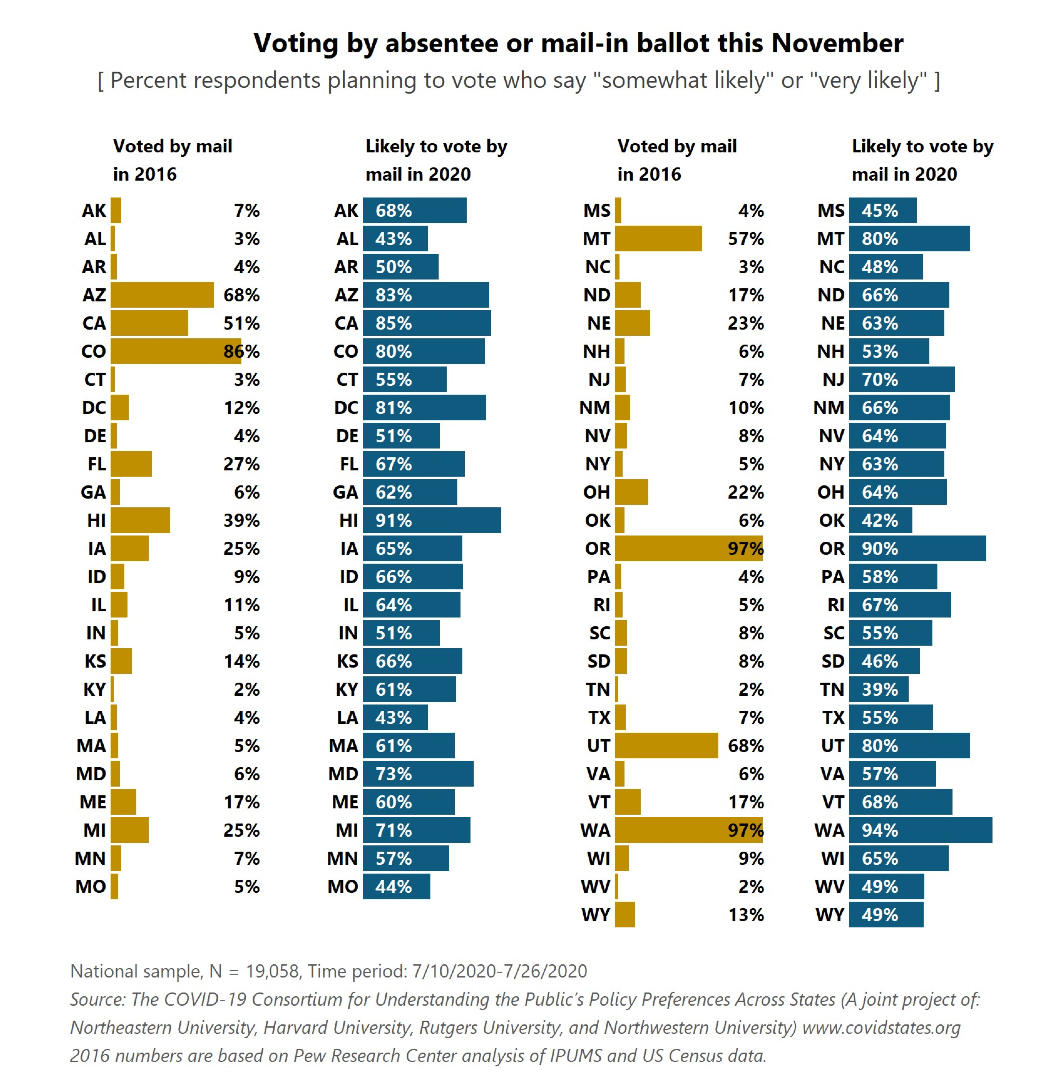
Chart of July 2020 opinion survey on likelihood of voting by mail in November 2020 election. (CC BY 4.0, Wikimedia Commons)
For the most part, however, its decisions have gone the other way, upholding more restrictive voting policies in 8 out of 11 cases. In July, for example, the court ruled against a decision in Alabama that had eased restrictions on absentee ballot submissions. That same week, it refused to reinstate an order in Texas allowing all voters to cast mail-in ballots due to the pandemic. Meanwhile, it seems that Pennsylvania Republicans are again trying to narrow the time frame on absentee ballots, announcing that they have returned to the Court for a further decision on the matter in light of Justice Amy Barrett’s certain confirmation.
The point is, this election should matter, both the form it takes and its outcome. If trust in the process of voting goes by the wayside, then the image of the United States as a failing, even a failed state will be hard to dispute. And if there is violence at the polls, or after the vote takes place, then we’ll sense an even deeper failure.
While some may view the coming election as a precipitous cliff, with dangers lurking everywhere, I also see it as an opportunity, which is why the tsunami of early voting, often involving hours of waiting, is an encouraging sign.
The line for #EarlyVoting at Catoctin High School in Thurmont, Maryland is currently ~115 deep. @frednewspost pic.twitter.com/lNEgviazc0
— Graham Cullen (@FNP_Cullen) October 28, 2020
BROOKLYN always shows up.
Love this marching band keeping energy levels high as voters wait outside Barclays Center.
Early voting runs from 10/24 thru 11/1 across NYC. Questions? Call 866-OUR-VOTE (866-687-8683). #MakeItCount #VoteEarly #VoteEarlyny
pic.twitter.com/sKtP9CbBwO— Kristen Clarke (@KristenClarkeJD) October 24, 2020
Despite the abyss that we face after four years of chaos and cruelty, this country still has a chance to prove that we are not a failing state and to reclaim our trust in our government, our protections, and one another. Only then will we be able to begin to repair the economic damage, the rank divisiveness, and the unequal allocation of resources that has fueled our disastrous pandemic response and, with it, a further erosion of trust in government.
Maybe we need to accept the challenge of proving in this election that one of the world’s longest-standing democracies can rise to the occasion and vote to uphold the foundation of its system, elections themselves. Maybe, using this very election, we can harness the civic pride that could lead to a successful restoration of our basic beliefs in constitutional principles and the rule of law. The chance to vote, no matter how long the lines and the wait, might be just the opportunity we need.
Karen J. Greenberg, a TomDispatch regular, is the director of the Center on National Security at Fordham Law, the host of the “Vital Interests Podcast,” the editor-in-chief of the CNS Soufan Group Morning Brief, and the author of Rogue Justice: The Making of the Security State and editor of Reimagining the National Security State: Liberalism on the Brink. Julia Tedesco helped with research for this article.
This article is from TomDispatch.com.
The views expressed are solely those of the authors and may or may not reflect those of Consortium News.
Please Contribute to Consortium News
Donate securely with
Click on ‘Return to PayPal’ here.
Or securely by credit card or check by clicking the red button:



I agree with the general theme of this article— that the problem goes way-beyond the Trump administration. As bad as they are, Trump didn’t nominate himself to the Republican Party candidacy back in 2016, and while he did lose the popular vote in the election, he won the electoral college vote, which is all that counts ultimately. (And I-for-one can’t delude myself into believing that the US is going to rid itself of that anachronism. Though that’s a good idea, we in the US don’t do ‘good ideas’ until we’ve exhausted all the alternatives.)
The problems in this country are structural, not personal/episodic. There were a couple of decades (ie; 1950’s-1970’s) where there was some progressive change, but starting with Jimmy Carter’s deregulation of various industries in the late 70’s, this country has re-embraced the laissez-faire/‘free-market’ Neo-liberal ethos and rewarded its POTUS proponents (e,g.; Reagan, Clinton, ‘W’, Obama) with two terms. So here we are in 2020 being reminded by Covid that willful neglect philosophy is NOT humanitarian.
Good article, but it would be wise for the author to treat things she reads in “The Atlantic” with a little more skepticism.
She quotes someone called George Packer as writing there: “the reaction to the coronavirus crisis here has been more “like Pakistan or Belarus — like a country with shoddy infrastructure and a dysfunctional government…”
If Mr Packer and The Atlantic weren’t so busy recycling regime change propaganda, they might acknowledge that Belarus has universal healthcare, free education, functioning public transport, and a higher standard of living than the United States or the EU.
According to that definition, we are absolutely already a failed state. For example, I got a chill down my spine reading an article from the Republican sheriff here telling folks to “prepare your mind and body for Covid” and that like, we are going to get sick inevitably, while he offers no willingness to enforce all of the mask mandates and restrictions that are necessary to curtail the viral spread. And yet, our taxes are very high, but we get Jack Squat in return for all of the tax dollars. It’s weird that Biden is running with the message that he won’t RAISE our taxes, which is to say, your already high tax burden is great for you, and taking care of you. No, it is not. It is all going to the military and wars mostly, our schools suck, our roads have potholes everywhere, we can’t get medical care affordably, and yet we just take it on the chin, and accept it. It’s tragic how far the country has fallen, really sad. And certainly, just seeing the hours-long lines to just cast a damn vote is the surest sign of total failure, how can we be so ass-backwards?
Trump Trump Trump Republicans Republicans Republicans
“All you have to do is think about Donald Trump’s endless claims — that this year’s election will be “rigged,” that mail-in ballots will be a fraud, that he won’t necessarily leave office even if the tallies are against him, and so on — to know that a particularly heavy burden has been placed on the results of Nov. 3. Add to that burden threats to the election’s viability via disinformation from foreign agents and hackers, Republican Party attempts at voter suppression, and threats of violence by so-called poll watchers.”
You could also think about the second primary in a row which the DNC rigged in favor of its corrupt warmongering corporatist racist choice. And you could mention the Democratic Party successfully fighting to not allow voters to vote for the Green Party in several states. Is it voter suppression to force a party completely off the ballot? Maybe only if it’s the Republicans who do so? I don’t know how biased partisans think, sorry.
And you could mention that Giuliani said “Donald Trump should not concede under any circumstances, because I think this is going to drag out, and eventually I do believe he will win if we don’t give an inch, and if we are as focused and relentless as the other side is”
Oh sorry, that was actually Hillary Clinton on Joe Biden.
Bravo! So true.
The idea that America is on the decline has been disjointedly in the air for at least half a century now. But American society itself, especially at the upper levels, but beneath the elitists level itself, has been deeply polarized over the issue at least until Obama’s time in office.
When Trump rode into the White House with his MAGA slogan in tow it still did not rhyem with the entire nation. But by the tail end of his term in office, attended well with all the socio-economic chaos, politico-legal crises and the misattended Covid-19 PLANdemic, rapidly the MAGA slogan, alas, began making universal sense.
But this time the American society is not polarized on the issue of America’s decline, as also borne out by the FSI rankings slide, but rather it is highly polarized on whether Trump himself is fit to address it and competent enough to undertake it. Still, with the Electoral Collage well entrenched in the American system will the peoples mandate mean much ?
The US IS a failed state. We just haven’t looked down yet to see that we’ve gone off the cliff.
A timely and very well put together article. We know most of what is in this but the arrangement and itemizing of sorts give. us a cohesive picture of all the problems we face. I am sad and mystified at the number of people I know who think they don’t need to vote during this election. Maybe this will prove to be the thing that wakes them up.
The “rise of deep poverty” began in the 1990s, with the Clinton administration. Democrats split apart their own voting base, middle class vs. poor, workers vs. those left jobless. The Obama years confirmed that this split is permanent. As the overall life expectancy of the US poor plunged below that of every developed nation, liberals maintained a vigorous pep rally for the middle class. The Democrats’ reckless Russiagate scheme drove even more voters away, and more deeply divided those who aren’t on the right wing. We’ve talked about it throughout, and apparently, party loyalists didn’t hear a word of it..